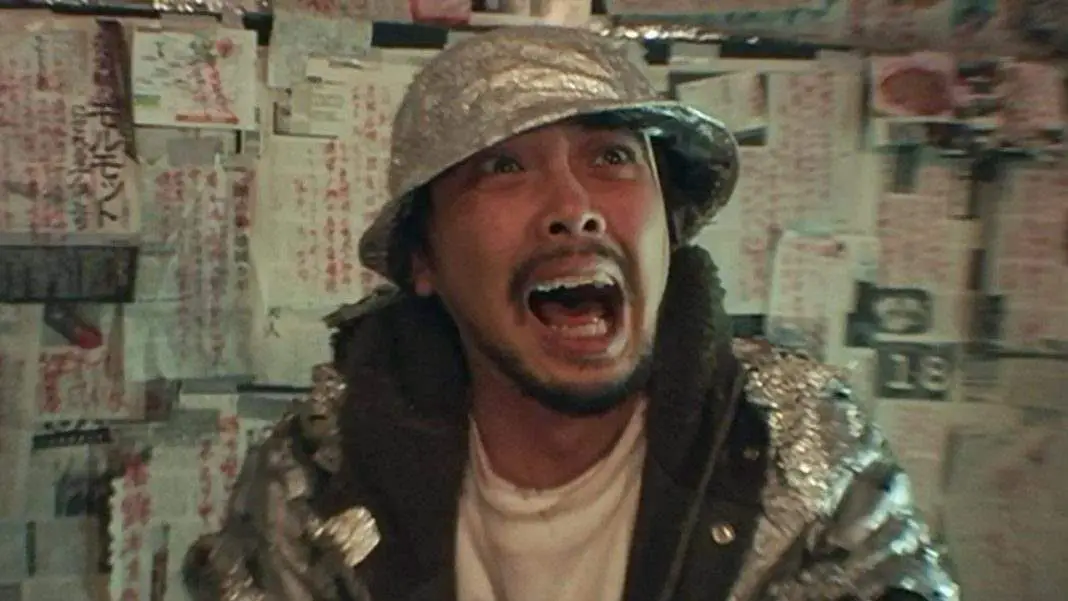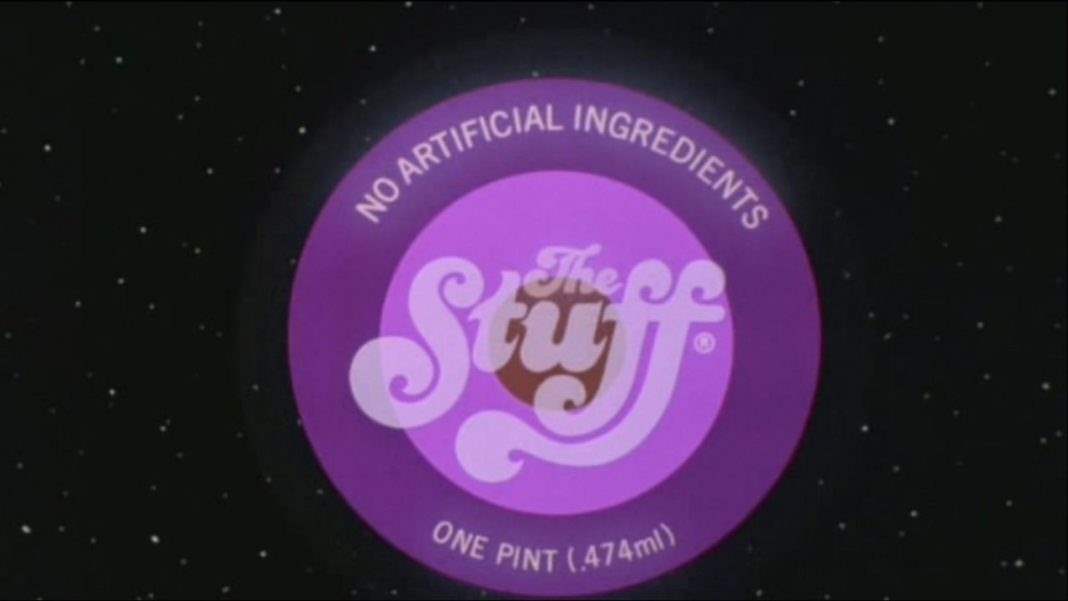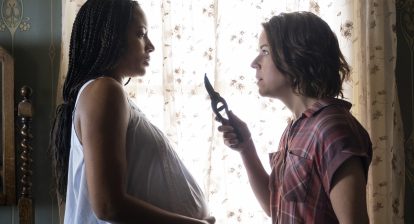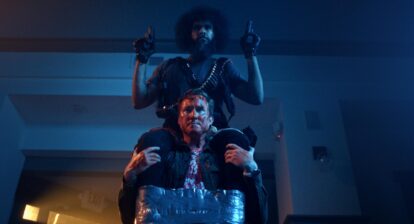Horror is evolving as a genre. Although your local multiplex is still peppered with the usual contenders, look a bit closer at the schedule and you’ll find the latest drama, thriller, or crime offering is closer to horror than you might expect. In this bi-weekly series, Joey Keogh presents a film not generally classified as horror and argues why it exhibits the qualities of a great flight flick, and therefore deserves the attention of fans as an example of Not Quite Horror. In this installment, we take a look at the shocking, cult-themed, Elizabeth Olsen-starring Martha Marcy May Marlene.
Before she was kicking some serious Avenger ass, Elizabeth Olsen, a young, unknown actress with a couple of famous sisters you might have heard of, was quietly making a name for herself on the indie circuit. She cut her horror teeth in the Silent House remake, before starring alongside Josh Radnor in Liberal Arts, Daniel Radcliffe in Kill Your Darlings and Dakota Fanning in Very Good Girls.
But it was in the intensely creepy, cult-themed Martha Marcy May Marlene, Olsen’s debut feature, where the young actress really made an impression. As the titular character, Olsen is required to fill the screen for 95% of the film. Her Martha/Marcy May/Marlene is simultaneously tortured, confused, angry, hurt and transfixed, a victim of institutionalised abuse who isn’t quite sure what she’s been through.
First time writer-director Sean Durkin utilises a dual narrative structure that juxtaposes Martha’s time spent with the cult (at first seen as a happy hippie commune) and the present day, as she tries to acclimate back into normal life, alongside her patient older sister. Eschewing the usual tendency towards meaningless exposition, Durkin wisely ensures nobody outright says there’s anything wrong with Martha. He populates his quiet, understated flick with key moments that signal something is off without ever explaining exactly what that something is.
There’s a distinct impression that Martha is drawn back to the life she’s left, even though, when we first meet her, she’s fleeing the compound (a sequence that involves an inspired use of shaky-cam). This creates an uneasy atmosphere around everything she does. There’s a constant suggestion that she might make a run for it, and yet she never stops looking over her shoulder. When she asks her sister how far away they are “from yesterday”, it’s a pained, desperate question to which no response could possibly be deemed appropriate.It’s in Martha’s inappropriate behaviour that the real impact of her abuse is revealed, as, among other incidents, she jumps into a lake naked in front of her sister’s husband, asks questions about their sex life and, in one particularly shocking moment, gets into bed next to them while they are making love. Martha’s complete lack of understanding about what she’s doing wrong showcases that she’s not a bad person, that she isn’t trying to make anyone uncomfortable, she’s just lost.
Martha Marcy May Marlene has just one truly shocking sequence, a rape that appears out of nowhere and whose repercussions are felt for the rest of the movie. A disturbing, reserved sequence, it’s hinted at later when Martha crawls into bed with her rapist for a cuddle, and again whenever her sister’s husband brushes past her. Martha is told by a fellow cult-member that what’s just happened to her is “truly good” and, later, we see her give basically the same coaching to a new recruit who’s about to undergo the “cleanse”.
Martha is someone who has lacked love her entire life, who craves it above all else. We learn that she’s been missing for two years, and that her sister was worried sick, but Martha can’t comprehend why. So much hurt, desperation, and fear is communicated in Martha’s first call to her sibling, but it seems, at the same time, as though she’s not entirely convinced she should be making it.
This confusion is present for much of the movie, as Martha attempts to recuperate while simultaneously refusing to admit that anything bad has happened to her. She may be gone from the cult, but she hasn’t truly escaped. The damage is never more evident than in a hideously awkward party, during which she accuses a stranger of being part of the cult, or when she pisses herself following a too-real nightmare, recalling a similarly heartbreaking moment in Adam Green‘s Frozen, which also marks a breakdown in the protagonist’s resolve.
 Olsen gives a mature and nuanced performance in the central role. Absolutely nothing needs to be said or done to communicate everything about her character. She’s well supported by Sarah Paulson and Hugh Dancy as her sister and her long-suffering husband, both of whom try their best to understand but soon find their patience tested as Martha’s behaviour turns increasingly erratic.
Olsen gives a mature and nuanced performance in the central role. Absolutely nothing needs to be said or done to communicate everything about her character. She’s well supported by Sarah Paulson and Hugh Dancy as her sister and her long-suffering husband, both of whom try their best to understand but soon find their patience tested as Martha’s behaviour turns increasingly erratic.
Likewise, John Hawkes is terrifying as cult leader Patrick, a man who purposefully barely raises his voice above a whisper. From the moment we meet him, it’s easy to see how one could fall under his spell, and how difficult it would be to escape his grasp. He’s the perfect cult leader: enigmatic, charming and threatening. He just as casually strums a guitar as he does rapes, shoots and steals from people.
Durkin cloaks his debut feature in a near-constant veil of moody darkness, a constant threat of rain hanging over everything. The sun never really breaks through, because Martha herself never manages to break through. Right up until the gloriously ominous final shot, Martha Marcy May Marlene is as mysterious as its titular character and its message is all the more powerful as a result.
Martha Marcy May Marlene is shocking without being showy, creepy without hammering the point home, and disturbing without lingering too long. It’s the kind of movie that only comes along every once in a while, and that usually passes under most people’s radars. Seek it out and leave it to settle under your skin for weeks to come.






